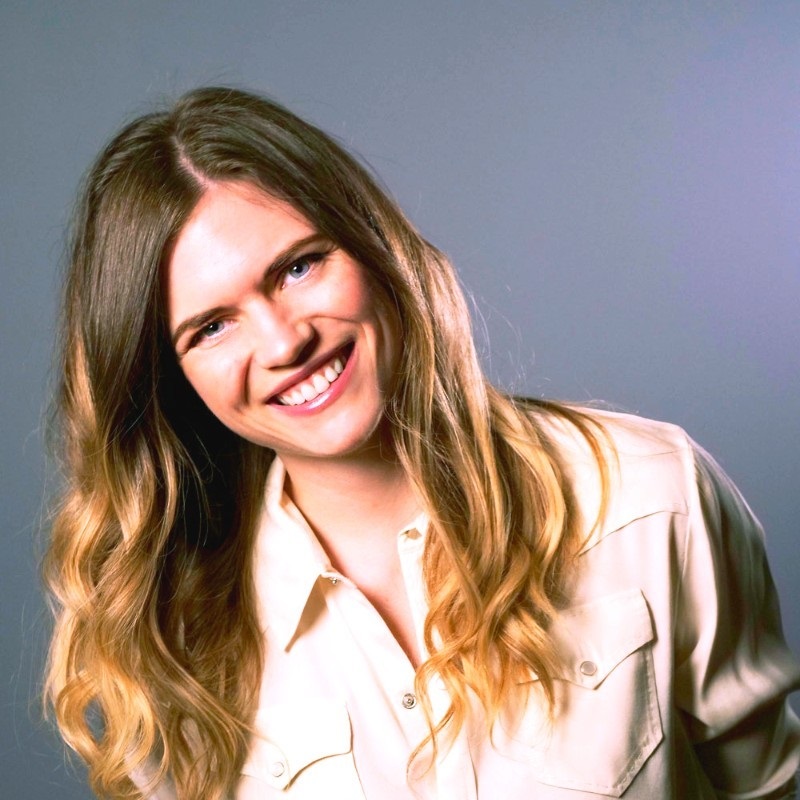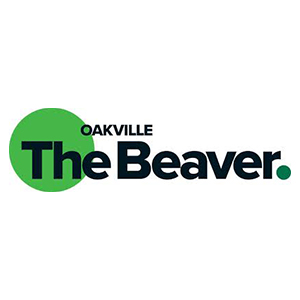
Conversion copywriting is a highly specialized service. Why specialize further as a Direct-to-Consumer or DTC conversion copywriter? Isn’t that niching to the point of obscurity?
In this post, I’ll reveal the experience and thinking that led me to choose DTC while highlighting positioning principles I’d like to think are universal.
How niche is the DTC conversion copywriting niche?
“Conversion copywriting” generates about 260 searches in the US monthly. That’s tiny.
For context, there are twice as many searches for “hobbit house architect”… a search that suggests intent. Go figure.
Most people have no idea what a conversion copywriter is, let alone a conversion copywriter who specializes in DTC brands.
In fact, so few people search for “DTC conversion copywriter” that there’s effectively zero search volume.
Even “pet eulogy”, the most obscure search I could think of at the moment, gets ~100 search hits a month.
In effect, specializing in DTC is taking an already narrow horizontal positioning/specialty (conversion copywriter) and layering in a narrow vertical positioning/niche (DTC).
(Here’s a recap on B2B vertical versus horizontal positioning.)
So, why choose a vertical niche at all?
Choosing a vertical niche is terrifying.
Instead of serving the universe of people who want what you offer, you’re choosing to serve just one slice of that market, monomaniacally…
For example, the slice of the tablet-buying market that just wishes their screen felt more like paper:
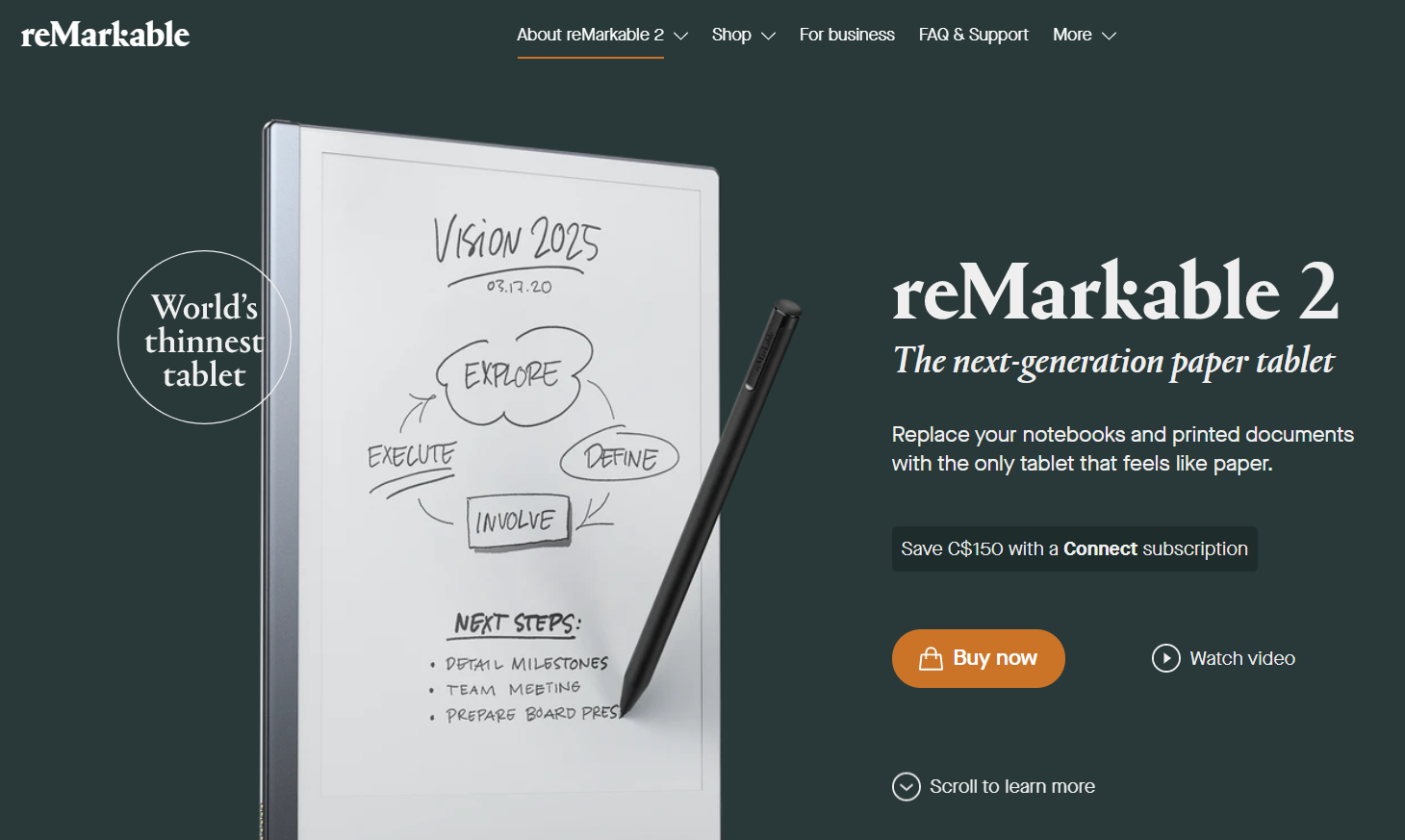
Our lizard brains are averse to scarcity, and yours will probably kick up a fuss when you decide to limit your options. That’s ok. It’s just trying to protect you.
The lizard doesn’t know that we live in a world of outrageous abundance that our instincts haven’t evolved to navigate.
Even the teeny tiny market of conversion copywriting is growing impressively as more people train with Copyhackers. It’s maturing as more conversion copywriters choose to specialize and niche.
And in a world of choices, the specialist is always at an advantage.
When you specialize in a vertical market…
- You can know and serve your target audience better than anyone else
- It’s easier to win mindshare, which drives word-of-mouth
- You narrow the field of competitors
(To paraphrase positioning experts like Blair Enns of Win Without Pitching and Louis Grenier of Everybody Hates Marketers.)
Specialization is essential for micro-businesses and startups. Once you’ve conquered a tiny market, you can move on to adjacent markets, but first, you need to win the loyalty of a small group of devoted fans.
And for a small firm like Conversion Copy Co, a small group of clients is all we need.
For the startup DTC brands we serve, it’s even more essential to tightly define who you serve because your customers long to be seen and heard. We love to see ourselves in a brand’s message.
When you can say who you’re for in a very specific way (e.g., we’re the tablet for people who miss paper)…
You engender connection and loyalty, FAST.
It’s what I tell my clients, and yet…
You don’t always need to niche to profit and grow …
Sometimes your “who” isn’t easy to define strictly by industry or demographic…
For example, it might be more important for you to attract leads with a certain level of awareness and sophistication about your market, plus a certain budget.
Or, your ideal B2C buyer might be defined by a pain that cuts across demographics, like insomnia.
I’ve written sales copy for B2B service providers, course creators, coaches, SaaS and technology brands, not-for-profits, B2C brands…
The common denominator? Their awareness and need.
Nearly 100% of my clients have been inbound, via search for “conversion copywriter”.
For years, my site (and before that, my profile on Copyhackers) has attracted more than enough inquiries from the sorts of people I like to work with: people primed to hire a conversion copywriter.
Because those people often just want to hire one conversion copywriter for the full funnel, I learned to write conversion copy for every marketing asset: websites, ad copy, landing pages, lead magnets, sales pages, nurturing, and sales emails.
Ultimately, I expanded to write brand messaging, too.
Not specializing and not niching was strategic, in that sense. It was easier for me to generate leads and sell when every business was fair game.
So, why tamper with a good thing?
Choosing a niche will save your sanity
Generalist B2B service businesses are simply harder to manage — at least, to manage well. Because no two sectors are sufficiently alike.
As a B2C comparable…
It’s like marketing yourself as a massage therapist for humans, livestock, companion animals, and exotic species.
Just imagine! Yet, most business sectors are really that different from each other.
That’s why I believe (and not everyone agrees) that it’s more important for copywriters to choose a niche (e.g. SaaS) than to choose a specialization (e.g. email conversion copywriting).
For years, though, I couldn’t resist the temptation to work with any interesting brand that came my way.
There’s a month I remember in particular. June 2020:
I was onboarding an AI SaaS startup, a real estate brokerage, a personal injury lawyer, a private jet broker, and an organic mattress brand.
While suddenly homeschooling boys in grades one and three because of the pandemic.
Sounds fun, right?
It can be…
But remember: to write copy that converts, you need to know the ideal buyer better than your client. (Almost better than the buyer knows themselves.) And you need to know the world of alternatives from which they can choose—the industry, yes, but also the substitutes.
You also need to know your clients’ business models to be a true strategic advisor. You need to know their language, their tools, the trends affecting their industries. And you need well-founded opinions on what works.
To go that deep across such diverse industries is unwise, if not impossible.
But I had to get to the end of my rope with most verticals.
Why I’m not a SaaS copywriter… Or a copywriter for course creators…
There’s a ton of demand for conversion copywriters in both sectors.
SaaS companies and course creators need conversion copywriters. Their products are intangible and complex and cannot be sold on imagery alone.
About SaaS:
SaaS is very attractive if you love to feel that you’re working at the edge of innovation on difficult, brainy things. (If it doesn’t make your eyes bleed, is it really work?)
And the case studies can be surreal. I once consulted on a pitch deck instrumental in raising $20M for an AI chip startup (high-tech, not SaaS, but close). Numbers like that… they’re seductive.
Ultimately, though?
When I took a cold, hard look at where I can position myself as “the only x for y” (key to positioning), I realized it’s not SaaS. I have no competitive advantage in SaaS.
Having that edge is a key criterion… As we’ll discuss.
About course launch copywriting:
I was unintentionally building a name for myself as a sales page copywriter after getting hired to write the 10x Facebook Ads sales page for Copyhackers. (The sales page that’s still live 2.5 years later at the time of writing this post.)
And in many ways, writing for course creators made sense as a niche because I’m such a fan of online learning.
But it takes deep time to know a course well enough to sell it. In what other industry do you have to take a course to understand each product? That’s before you even come up with a conversion strategy.
Plus, course launch copy is notoriously long-form. That Copyhackers sales page? 9,000 words of artfully crafted, deeply emotional sales copy.
Emotional because nearly every course creator is selling transformation when you get down to it.
There’s a quote to the effect that writing is easy, you just open a vein and bleed. That’s what it’s like to write launch copy. You have to open the vein every single time.
I am grateful for the course creator clients who came with solid positioning, brand messaging, and dialed-in marketing funnels. Those clients made it possible for me to get outstanding conversion rates while making comfortable money on launch copy.
But with the exception of continuing to serve one exceptional course creator client, I’m actively referring out to other conversion copywriters.
So, once I’d ruled out SaaS and course launch copywriting, how did I choose DTC brands?
By asking myself just a few questions.
Three questions to ask before choosing a vertical market
I think there are three criteria for a high-potential niche. To say “this is my one and only” you should have:
- An interest. Could you spend 10 years serving this type of customer or client without lighting a match to set your hair on fire?
- An edge. Do you have an advantage with this vertical? (Reputation, experience, knowledge)
- An ROI. Can you get significant results, relatively fast, and capture enough value in the process?
Ideally, you should have all three. (Again, whether you’re selling silk stockings or branding services, this is true.)
I’ve had some fabulous experiences serving clients scattered across sectors. That’s why it took me so long to narrow my vertical positioning.
But through the lens of the above criteria, DTC is the obvious niche for Conversion Copy Co.
Why DTC brand copywriting is nevertheless a bizarre choice…
Even as DTC was calling my name, I had doubts.
Namely, there’s far less demand for conversion copywriting from DTC brands. Again, not a blessed soul searches for “DTC conversion copywriter”. Ever.
So, why is it that DTC brands aren’t searching for conversion copywriters?
Many DTCs define what they need as “brand copywriting”, “creative copywriting”, or “content marketing” and they hire full-service agencies or in-house copywriters.
They don’t necessarily consider hiring for sales copy or conversion copywriting.
I have a theory as to why that is.
I think it’s because B2C advertising already had its day with sales copywriting — only then it was called “direct response”.
Back in the golden age of Ogilvy et al, print ads for toothpaste and beauty bars and margarine were long, psychologically complex, but often bizarre and offensive…
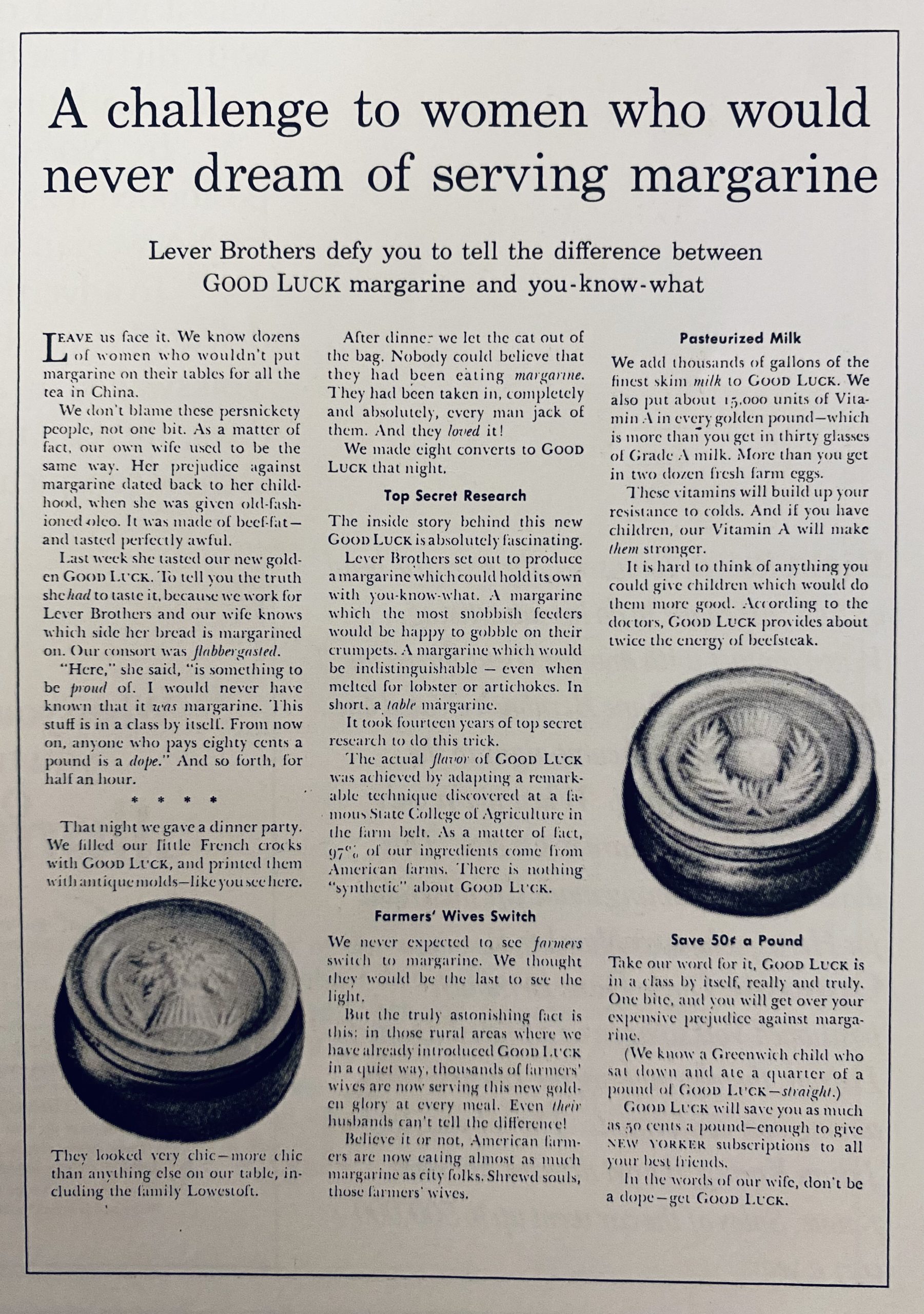
Then we had late-night infomercials and direct mail sales letters, both of which made selling seem sleazy.
The pendulum always swings…
Today, creative directors say they want copy that’s concise… even if it lacks any distinct sales message. “Concise” isn’t a preference driven by data on what converts. It’s a matter of taste.
DTCs want to play it cool, reserved, like we’re not trying too hard with too many words.
To the modern DTC marketer, I can see how conversion copywriting might seem like it is trying too hard…
Conversion copywriting doesn’t shy away from customer fears, vanities, desires, doubts, frustrations, the dark side of the psyche… the hilarious truths about why we buy, and how we use products when we’re honest with ourselves.
In contrast, typical B2C e-commerce copywriting pares the psychology way down. Often, it also pares down the product information to a ridiculous degree.
Mass retailers that use e-commerce as a secondary channel are very guilty of this, which makes sense: delivering a rich digital experience isn’t in their marketing DNA. (See this post on why e-commerce product pages don’t convert.)
At other times, copy minimalism is a pose of luxury brands. It signifies: our brand speaks for itself. True for established luxury brands, but likely not true for DTC startups that imitate the look and feel of high-end luxury e-comm sites.
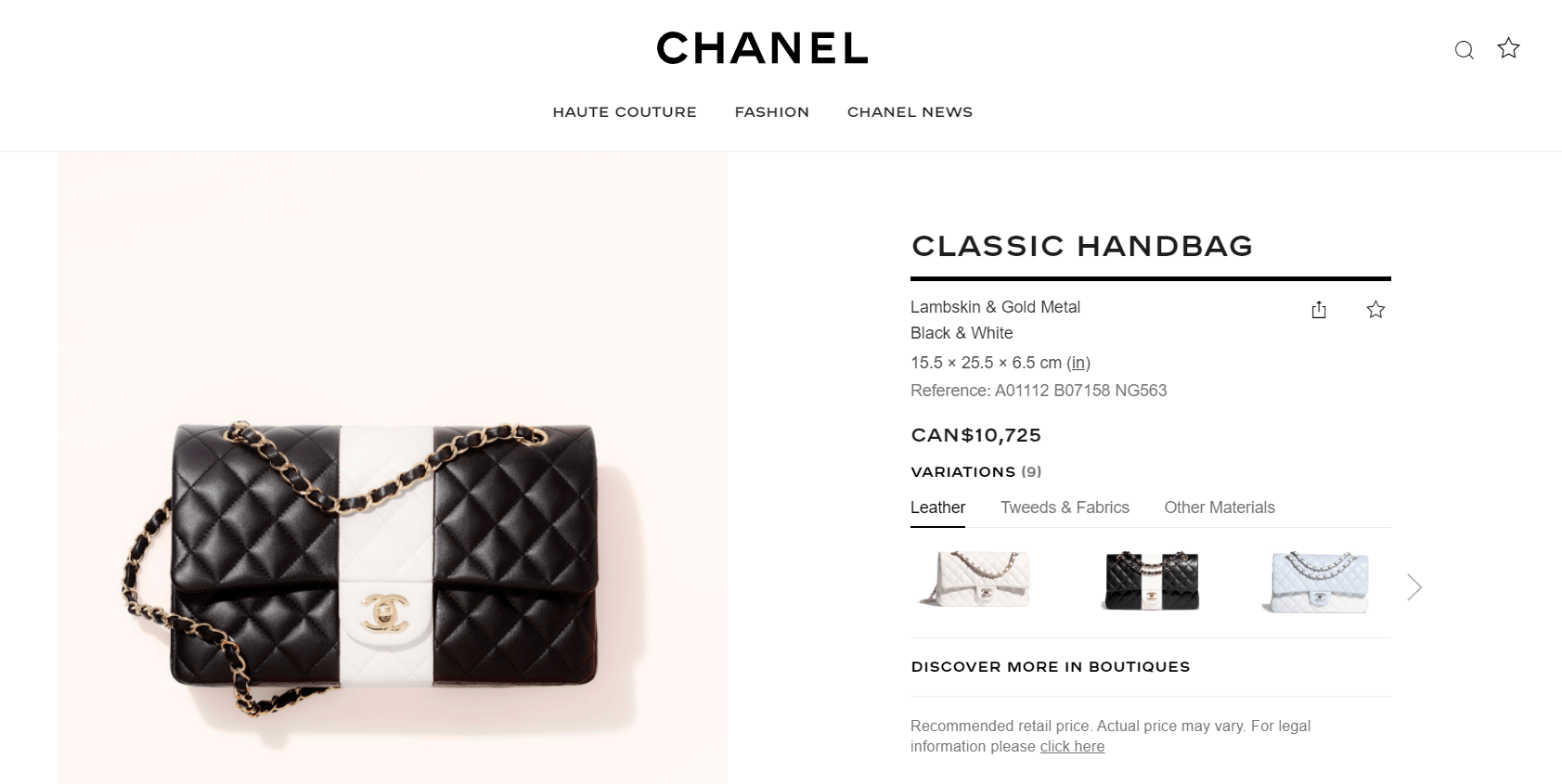
Just presenting the product for sale is not enough for startup DTC brands.
As Simbar Dube* of Invesp says in an article on why DTC brands fail, it’s a mistake to think that getting found is enough:
“The problem with most D2C brands is that they believe that marketing is advertising. They advertise their products on different paid channels and think that they have done the marketing.”
(*Simbar is his preferred spelling, though you may find his work attributed otherwise.)
And that, I think, is why many DTC brands aren’t beating down the doors of conversion copywriters. Psychologically simplistic copy is easy to write.
And yet…
3 reasons DTC brands need conversion copywriting more than ever
There are at least three reasons why some DTCs need conversion copywriting to sell at scale.
1. Not all products can be sold with photography & a few lines of copy
Going back to Dube’s quote above, some DTC marketing funnels consist of nothing more than an Instagram ad driving to a product page with a large image and short copy.
Obviously, this can work. A simple, visual product can be sold with gorgeous photography, a brand-centric headline, and a short product description.
Especially if it’s from a well-known brand like Mejuri.
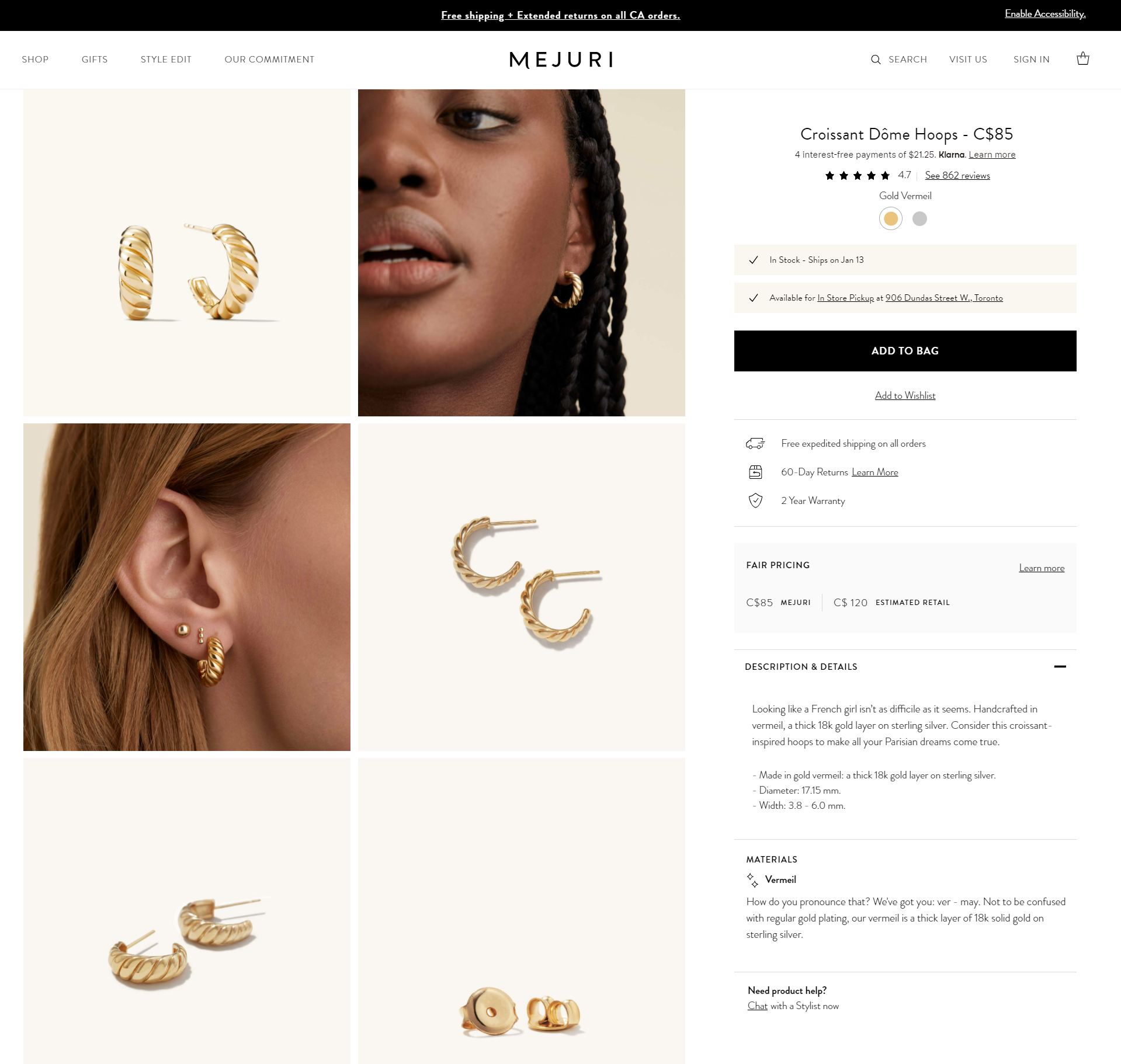
But many DTC products can’t be sold on visuals alone.
Those products have to be sold with words. And in place of the old silver-tongued salesperson on the department store floor, we now have the conversion copywriter.
Mattresses are a fabulous example, and I speak from professional experience.
The entire DTC mattress industry is engaged in a competitive game of conversion copy one-upmanship. Each brand is determined to outdo the next with more detailed descriptions of everything from the inner coils to the cooling technology. That’s why mattress product pages can easily be 2,000 words long.
Other DTC products that have to be sold with sales copy?
- High-tech and high-end sports equipment
- Consumer electronics
- Skincare
- Appliances
- Supplements and health products
- Any product that isn’t visual enough to be sold with imagery alone
Take the Squatty Potty, for example, and every DTC brand that’s worked with the Harmon Brothers. The Murphy Ladder and ChatBooks come to mind…
Those brands are all sold with the techniques of conversion copywriting. And probably could not be sold otherwise. Not at scale.
And then, there’s the fact that you can raise the price when you tell the story.
Weaving layers of meaning into the brand and offering product education adds perceived value beyond the sum of the product parts.
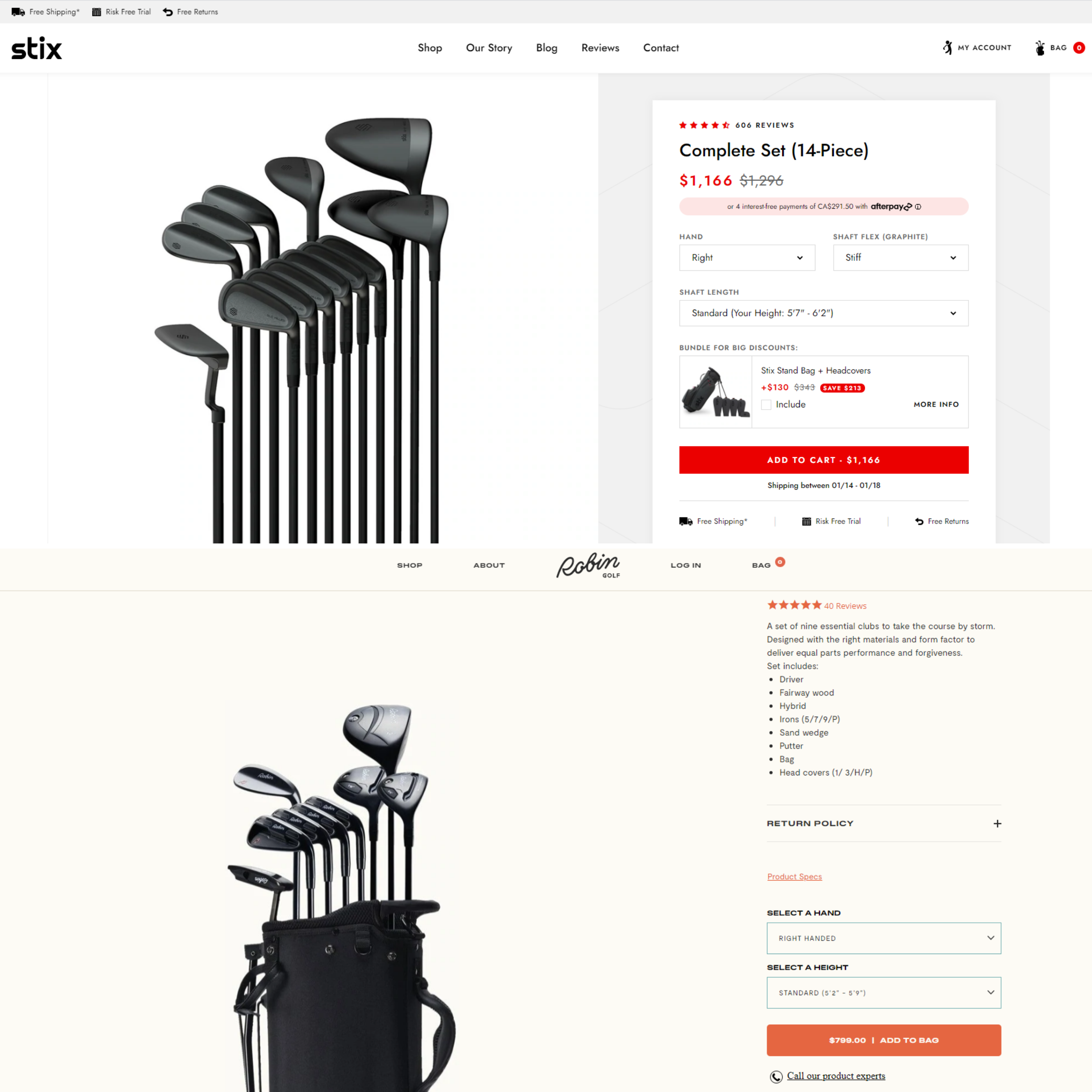
Take Stix Golf versus Robin Golf, for example.
Stix invests in rich conversion copy on the DTC’s product pages. Robin Golf does not.
Based on reviews, at least, Stix can sell far more clubs at a higher price than Robin.
Obviously, product design, quality, reputation, and buzz all factor into why Stix appears to be doing better. But it’s undeniable that they’ve gone maximalist with their copy, and it’s working.
2. DTC depends on personalized marketing
Personalization is one strategy by which DTCs are getting an edge.
Personalized messaging and recommendations can be delivered on the website, in ads, in emails. It’s a data-driven performance marketing strategy.
I’d argue that most traditional copywriters are not prepared to think in terms of personalization or recommend personalization strategies.
That’s because traditional brand and creative copywriting disciplines are rooted in client-delivered creative briefs…
Which are almost inevitably built around a far more static view of the customer avatar, with an emphasis on the brand versus the audience.
Conversion copywriters, on the other hand, are performance marketers and personalization is built into our discipline.
That’s because our work is rooted in data on audience beliefs, preferences, and behaviors.
We start with voice-of-customer research and build psychological avatars before even writing, and we continue to optimize copy based on how people engage…
Which is exactly what you need to develop a personalized marketing strategy.
3. Conversion copywriting is insight-driven
Returning to Dube’s analysis:
For DTCs to survive, they need to go beyond advertising. Dube recommends marketing strategies based on deep customer insight.
DTC founders often start with that insight because they’re close to the customer (as Suzie Yorke explains in this interview on positioning CPG brands).
Over time, as brands lose face-to-face experience with their audience, they can also lose touch. And losing insight is ultimately death to a brand.
Conversion copywriting is, by definition, an insight discipline. When you work with a conversion copywriter, you keep your finger on the pulse of your most valuable customers.
Why I’m passionate about *select* DTC brands…
“Because of the many third party relationships that manufacturers and distributors must maintain, they do not often feel at liberty to use a stronger voice to fight injustice or protect the environment.
DTC brands, on the other hand, have more ideological freedom to embrace these values and further endear like-minded consumers.” (Grin.co, Top DTC Brands to Watch in 2021)
Right now, DTC feels like an exciting (if cluttered and overwhelming) place to be.
Exciting because brands are innovating to reduce waste and to solve social issues.
Overwhelming because there are so many new brands vying for attention. Some won’t make it without a message that cuts through the noise and captures the imagination.
And that’s where conversion copywriting comes in.
DTC brands are going to need what only conversion copywriting can offer.
Because as conversion copywriters, we have real powers that matter more now than ever. We don’t just convince people to buy. If we’re good at what we do, we create consumer identities.
It’s what we’re trained to do. Conversion copy is designed to convert non-buyers into buyers by shifting deep beliefs and affiliations.
Take organic mattresses as an example.
Everyone who buys an organic mattress has been through a process of conversion.
At one point, you’re totally unaware of organic mattresses as a thing and don’t see why you should care.
And then, through a process of conversion, you become a person who willingly spends thousands of dollars more to sleep on a certified organic surface.
Your beliefs and your very identity change in the process. You aren’t the same consumer anymore. You may permanently shift your buying habits across product categories.
Consumer conversions like these happen all the time.
But now we have to do it at scale, to create a planet of more conscious consumers…
That means convincing people to pay more for products that are made to last.
Products that represent the underrepresented.
Products that are sustainably and ethically made.
DTC brands may only play a microscopic role in the solution…
And we know that feminist panties made from recycled water bottles will not save the world.
But the proliferation of DTC brands is creating healthy competition to do better for people and the planet.
If you’re a DTC marketer who realizes that conversion copywriting must be part of your winning strategy, reach out.
2024 update on specializing in DTC conversion copywriting
I wrote this post in January 2022, and it’s now April 2024. Time to let you know how specializing in DTC is going!
It wasn’t a straight line. There were times in 2023 when I would have hesitated to tell a friend to niche or specialize. I wondered if we were too specialized to generate inbound leads… which is the only way I generate leads. The search volume for DTC and e-commerce copywriter keywords is very low.
Now, two years into specializing, I would not have it any other way. We still sometimes serve clients outside of DTC and e-commerce, but only when we have a long-standing relationship. All new clients are B2C, typically selling directly to consumers, and it has made a huge difference in my sense of satisfaction, efficiency, and authority.
Within this niche, we have the expertise now to consult as strategists with less emphasis on the copy. This is a natural evolution. We still write and optimize high-converting copy, but we spend a lot more time advising clients on conversion marketing. I think this is important as AI advances.
Specializing in DTC copy feels like the right choice and I’m excited to meet new clients in this space!


